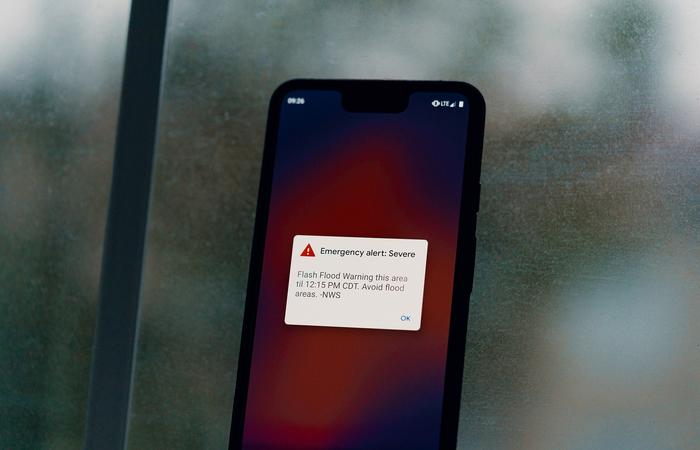Mobile phones have become invaluable for receiving emergency alerts such as weather warnings, evacuation notices and notifications about missing persons. In Japan, where earthquakes are frequent, they are vital for delivering earthquake warnings and advising people to take protective actions beforehand. To deal with such situations promptly, the Earthquake Early Warning (EEW) system sends out notifications to areas expected to experience strong tremors by detecting primary seismic waves (P-waves) that arrive before the secondary waves (S-waves). However, the short time between receiving the notification and the arrival of S-waves requires immediate response from individuals in affected areas.

Credit: Image Credit: Flash Flood Warning- Cell Phone Wireless Emergency Alert by Tony Webster
Mobile phones have become invaluable for receiving emergency alerts such as weather warnings, evacuation notices and notifications about missing persons. In Japan, where earthquakes are frequent, they are vital for delivering earthquake warnings and advising people to take protective actions beforehand. To deal with such situations promptly, the Earthquake Early Warning (EEW) system sends out notifications to areas expected to experience strong tremors by detecting primary seismic waves (P-waves) that arrive before the secondary waves (S-waves). However, the short time between receiving the notification and the arrival of S-waves requires immediate response from individuals in affected areas.
But this is not always the case as Professor Kazuya Nakayachi from the Faculty of Psychology, Doshisha University, Japan, explains: “Designers of the disaster information system assume that those who receive an emergency alert will immediately take protective action, but this is rarely the case. People stay still looking at their cell phone screens receiving the alert.” Surveys conducted in Japan found that despite advanced warnings, people fail to take protective actions.
To determine why individuals might not act upon receiving such warnings delivered through mobile phones, Prof. Nakayachi, along with Dr. Ryosuke Yokoi from Kyoto Tachibana University and Dr. James Goltz from Kyoto University conducted two surveys, investigating people’s responses immediately after receiving EEW alerts on their mobile phones between 2021 and 2023. Their findings, published online in the International Journal of Disaster Risk Reduction on 15 April 2024, aim to improve the effectiveness of EEW alerts to reduce the risk of injury or fatalities during earthquakes.
The researchers collected responses from participants affected by the 6.0 magnitude earthquake in Chiba Prefecture, which occurred on October 1, 2021, and the 6.3 magnitude earthquake in Ishikawa Prefecture on May 5, 2023. To determine the initial reactions to the alerts, the participants were asked the following question: “When you received the EEW alert on your mobile phone, what did you do first and what did you do next?”
Out of 3000 participants who experienced the earthquake at Chiba, about 34% said that their first reaction was to pay attention to their mobile phones by listening to the alert or checking the screen. Out of the 829 participants who checked their phone screens as their first reaction, only 51 participants said that they took protective measures as their second reaction. But, 36% of the participants said that they did not take any action upon receiving the alert. Instead, they waited for the tremors to begin and stayed still. Only 7% took immediate steps to protect themselves, and 10% listed protective actions as their second response.
Similar reactions were observed in the group from Ishikawa Prefecture. Out of 1000 responses, 46% of participants reported paying attention to their mobile phones as their first reaction, with only 20 participants taking protective measures as their second reaction. Additionally, 30-40% of participants did not take any protective actions, and less than 10% acted immediately upon receiving the EEW alert. The results suggest that the EEW alert was ineffective at prompting the intended response from the recipients.
To address this, the researchers suggest three measures. First, to prevent people from wasting time unnecessarily looking at their phones for more information, further, they propose conducting nationwide emergency drills to train people to react immediately when peoples receive EEW alerts on their phones. Second, they recommend maintaining a safe environment at home, work, and school by securing furniture and storing heavy items near the ground. This can help protect people when it is difficult to take protection actions during an earthquake. Lastly, the researchers suggest that adding clear instructions like ‘protect yourself now’ to EEW alert messages would encourage people to react immediately.
With the widespread availability of mobile phones, many governments are increasingly sending alerts through these devices. However, as the study shows, it is not just about delivering the message; the system needs to ensure that the alert motivates people to act.
“To improve the effectiveness of warning systems, researchers and practitioners should consider not only the delivery of warnings to the public but also track their behavioral and psychological reactions after receiving these warnings,” says Prof. Nakayachi.
About Professor Kazuya Nakayachi from Doshisha University, Japan
Kazuya Nakayachi is a professor in the Faculty of Psychology at the Department of Psychology. He specializes in the fields of risk perception, trust, and humanities & social sciences, with a focus on social psychology. He has held prestigious positions in various universities and research societies and has published numerous papers on risk analysis, human behavior, and disaster preparedness in reputed scientific journals.
Funding information
This work was supported by JSPS KAKENHI [grant number 20H01756]
Media contact:
Organization for Research Initiatives & Development
Doshisha University
Kyotanabe, Kyoto 610-0394, JAPAN
E-mail:jt-ura@mail.doshisha.ac.jp
Journal
International Journal of Disaster Risk Reduction
Method of Research
Observational study
Subject of Research
People
Article Title
Human behavioral response to earthquake early warnings (EEW): Are alerts received on mobile phones inhibiting protective actions?
Article Publication Date
15-Apr-2024
COI Statement
The authors declare that they have no known competing financial interests or personal relationships that could have appeared to influence the work reported in this paper.



